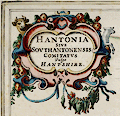
 Map Group SOUTHEY 1807
Map Group SOUTHEY 1807

Southey, Robert & Simmons, Jack (ed): 1951: Cresset Press (London)
Robert Southey was born 1774, son of a linen draper in Bristol. He attended Westminster School from where he was expelled for a precocious essay against flogging. He went to Balliol College, Oxford. He became a poet and letter writer, as well as a translator of works from Spanish. Robert Southey was a friend of Coleridge and Wordsworth, and lived in Keswick from about 1810. He married Edith Fricker, whose sister married Coleridge; and later married Caroline Bowles.



... Salisbury, Wiltshire; through Stockbridge, Basingstoke, Hartfordbridge, Hampshire; then Bagshot, Surrey; Staines, Middlesex; to London.
...
From this place Salisbury Plain stretches to the north, but little of it is visibile from the road which we were travelling: much of the wide waste had lately been inclosed and cultivated. I regretted that I could not visit Stonehenge, the famous druidical monument, which was only a league and a half distant: ...
Stockbridge and Basingstoke were our next stages: the country is mostly down, recently enclosed, and of wonderfully thin population in comparison of the culture. Indeed harvest here depends on a temporary emigration of western clothiers, who come and work during the harvest months. The few treees in this district grow about the villages which are scattered in the vallies - beautiful objects in an open and naked country. You see flints and chalk in the fields, if the soil is not covered with corn or turnips. Basingstoke is a town which stands at the junction of of five great roads, and is of course a thriving place. At the north side is a small but beautiful ruin of a chapel once belonging to a brotherhood of the Holy Ghost. J- lead me to see it as a beautiful object, in which light only all Englishmen regard such monuments of the piety of their forefathers and of their own lamentable apostasy. The roof had once been adorned with the history of the prophets and the holy apostles; but the more beautiful and the more celebrated these decorations, the more zealously were they destroyed in the schism. I felt deeply the profanation, and said a prayer in silence upon the spot where the altar should have stood. One relic of better times is still preserved at Basingstoke: in all parishes it is the custom, at stated periods, to walk round the boundaries; but here, and here only, is the procession connected with religion: they begin and conclude the ceremony by singing a psalm under a great elm which grows before the parsonage-house.
Two leagues and a half of wooded country reach Hertford Bridge, a place of nothing but inns for travellers: from hence, with short and casual interruptions, Bagshot Heath extends to Egham, not less than fourteen miles. ...


: 1948: Concise Dictionary of National Biography: Oxford University Press
Harvey, Paul: 1967 (4th edn): Oxford Companion to English Literature: Oxford University Press

